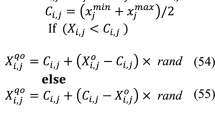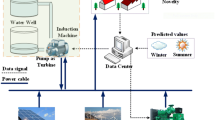Abstract
This paper suggests day-ahead scheduling of microgrid with and without demand side management considering hydrogen storage and plug-in electric vehicles. This is a highly constrained mixed integer nonlinear programming problem which is solved by using quasi-oppositional fast convergence evolutionary programming (QOFCEP) technique. The concept of the quasi-opposition-based learning is incorporated in fast convergence evolutionary programming (FCEP) to improve the efficiency and quality of the solution. QOFCEP employs quasi-oppositional based learning (QOBL) for population initialization and generation jumping. The studied microgrid comprises three diesel generators, one mini-hydro power plant, two wind turbine generators, two solar PV plants, one hydrogen storage system and plug-in electric vehicles. Simulation outcomes of the suggested QOFCEP technique have been compared with those obtained by FCEP and differential evolution (DE). It is seen from numerical results that the cost obtained with DSM is about 0.81% lower than the cost obtained without DSM. It is also seen that the cost obtained from QOFCEP is about 0.52% and 0.78% lower than the cost obtained from FCEP and DE, respectively. The suggested QOFCEP technique has the ability to bestow superior-quality solution.









Similar content being viewed by others
Data availability
Data will be made available on request.
Abbreviations
- OBL:
-
Oppositional based learning
- DG:
-
Diesel generator
- DE:
-
Differential evolution
- DSM:
-
Demand side management
- FC:
-
Fuel cell
- FCEP:
-
Fast convergence evolutionary programming
- HSS:
-
Hydrogen storage system
- MG:
-
Microgrid
- MHPP:
-
Mini-hydro power plant
- PEV:
-
Plug-in electric vehicles
- QOBL:
-
Quasi-oppositional based learning
- QOFCEP:
-
Quasi-oppositional fast convergence evolutionary programming
- SPVP:
-
Solar PV plant
- WTG:
-
Wind turbine generator
- \(C_{T}\) :
-
Total cost
- \(a_{di} ,b_{di} ,c_{di}\) :
-
Fuel cost coefficients of \(i\)th DG
- \(P_{dt}\) :
-
Power output of \(i\)th DG at time \(t\)
- \(P_{di}^{\min } ,P_{di}^{\max }\) :
-
Minimum and maximum generation limits for \(i\)th DG
- \(UR_{di} ,DR_{di}\) :
-
Ramp-up and ramp-down rate limits of the \(i\)th DG
- \(P_{hlt}\) :
-
Power output of \(l\)th MHPP at time \(t\)
- \(Q_{lt}\) :
-
Inflow rate of \(l\)th MHPP at time \(t\)
- \(H_{l}\) :
-
Height of the water fall of \(l\)th MHPP
- \(\gamma\) :
-
Specific weight of water
- \(\eta_{Gl}\) :
-
Efficiency of \(l\)th generator
- \(\eta_{{{T}l}}\) :
-
Efficiency of \(l\)th turbine
- \(P_{hl}^{\max }\) :
-
Installed capacity of \(l\)th MHPP
- \(Pw_{jt}\) :
-
Available power output of \(j\)th WTG at time \(t\)
- \(Pwr_{j}\) :
-
Rated power output of \(j\)th WTG
- \(Kw_{j}\) :
-
Direct cost coefficient for the \(j\)th WTG
- \(Ow_{jt} \left( {Pw_{jt} } \right)\) :
-
Reserve cost function due to overestimation of \(j\)th WTG at time \(t\)
- \(Uw_{jt} \left( {Pw_{jt} } \right)\) :
-
Penalty cost function due to underestimation of \(j\)th WTG at time \(t\)
- \(uw_{j} ,ow_{j}\) :
-
Penalty cost and reserve cost for the \(j\)th WTG
- \(fw\left( y \right)\) :
-
Weibull probability distribution function of wind power \(y\)
- \(Pw_{jt}^{\min } ,Pw_{jt}^{\max }\) :
-
Minimum and maximum power output of \(j\)th WTG at time \(t\)
- \(V_{{{\text{in}}}}\) :
-
Cut in wind speed
- \(V_{{{\text{out}}}}\) :
-
Cut out wind speed
- \(Vr_{t}\) :
-
Rated wind speed at time \(t\)
- \(Vw_{t}\) :
-
Forecasted wind speed at time \(t\)
- \(Ppv_{kt}\) :
-
Power output from \(k\)th SPVP at time \(t\)
- \(Ppv_{rk}\) :
-
Rated power output of \(k\)th SPVP
- \(G_{t}\) :
-
Solar irradiation forecast at time \(t\)
- \(Kpv_{k}\) :
-
Direct cost coefficient for the \(k\)th SPVP
- \(Opv_{kt} \left( {Ppv_{kt} } \right)\) :
-
Reserve cost function due to overestimation of the \(k\)th SPVP at time \(t\)
- \(Upv_{kt} \left( {Ppv_{kt} } \right)\) :
-
Penalty cost function due to underestimation of the \(k\)th SPVP at time \(t\)
- \(upv_{k} ,opv_{k}\) :
-
Penalty cost and reserve cost for the \(k\)th SPVP
- \(fpv\left( x \right)\) :
-
Lognormal probability distribution function of solar power \(x\)
- \(Ppv_{kt}^{\min } ,Ppv_{kt}^{\max }\) :
-
Minimum maximum power output of \(k\)th SPVP at time \(t\)
- \(T_{{{\text{ref}}}}\) :
-
Reference temperature
- \(T_{{{\text{amb}}_{t} }}\) :
-
Ambient temperature at time \(t\)
- \(\alpha\) :
-
Temperature coefficient.
- \(HST_{t}\) :
-
The amount of hydrogen stored in the hydrogen tanks at time \(t\)
- \(HST^{\min } ,HST^{\max }\) :
-
Lower and upper limits for amount of the stored hydrogen in the hydrogen tanks
- \(P_{{{\text{FC}}_{t} }}\) :
-
FC power at time \(t\)
- \(P_{EVmt}\) :
-
Charging load of \(m\) th PEV at time \(t\)
- \(P_{EVm}^{\min } ,P_{EVm}^{\max }\) :
-
Minimum and maximum charging power of \(m\)th PEV
- \(L_{{{\text{Base}},t}}\) :
-
Forecasted base load at time \(t\)
- \(DR_{t}\) :
-
Percentage of forecasted based load participated in DRP at time \(t\)
- \(Ls_{t}\) :
-
Shiftable load at time \(t\)
- \(\eta_{{{\text{EL}}}}\) :
-
Efficiency of the electrolyzer
- \(\eta_{{{\text{FC}}}}\) :
-
Efficiency of the FC
- \(N_{d}\) :
-
Number of DGs
- \(N_{{{\text{PV}}}}\) :
-
Number of SPVPs
- \(N_{w}\) :
-
Number of WTGs
- \(N_{hg}\) :
-
Number of MHPPs
- \(N_{{{\text{EV}}}}\) :
-
Number of PEVs
- \(t,T\) :
-
Time index and scheduling period
- \(T_{{\text{equal - generation}}}\) :
-
Set that contains all time intervals when total generated power is equal to the demand
- \(T_{{\text{excess - generation}}}\) :
-
Set that contains all time intervals when total generated power is more than the demand
- \(T_{{\text{deficit - generation}}}\) :
-
Set that contains all time intervals when total generated power is less than the demand
References
Abdolazimi O, Esfandarani MS, Salehi M, Shishebori D (2020) Robust design of a multi-objective closed-loop supply chain by integrating on-time delivery, cost, and environmental aspects, case study of a tire factory. J Clean Prod 264:121566
Abdolazimi O, Ma J, Shishebori D, Ardakani MA, Masaeli SE (2023) A multi-layer blood supply chain configuration and optimization under uncertainty in COVID-19 pandemic. Comput Ind Eng 182:109441
Abed-alguni BH, Paul D (2021) Island-based Cuckoo search with elite opposition based learning and multiple mutation methods for solving discrete and continuous optimization problems. Res Sq. https://doi.org/10.21203/rs.3.rs-773831/v1
Abed-alguni BH, Alawad NA, Al-Betar MA, Paul D (2003) Opposition-based sine cosine optimizer utilizing refraction learning and variable neighborhood search for feature selection. Appl Intell 53:13224–13260. https://doi.org/10.1007/s10489-022-04201-z
Alawad NA, Abed-alguni BH (2020) Discrete island-based cuckoo search with highly disruptive polynomial mutation and opposition-based learning strategy for scheduling of workflow applications in cloud environments. Arab J Sci Eng. https://doi.org/10.1007/s13369-020-05141-x
Aliasghari P, Mohammadi-Ivatloo B, Alipour M, Abapour M, Zare K (2018) Optimal scheduling of plug-in electric vehicles and renewable microgrid in energy and reserve markets considering demand response program. J Clean Prod 186:293–303
Alipour M, Mohammadi-Ivatloo B, Moradi-Dalvand M, Zare K (2017) Stochastic scheduling of aggregators of plug-in electric vehicles for participation in energy and ancillary service markets. Energy 118:1168–1179
Alshammari M, Al-Smadi M, Arqub OA, Hashim I, Alias MA (2020) Residual series representation algorithm for solving fuzzy duffing oscillator equations. Symmetry. https://doi.org/10.3390/sym12040572
Arqub OA, Abo-Hammour Z (2014) Numerical solution of systems of second-order boundary value problems using continuous genetic algorithm. Inform Sci 279:396–415
Arqub OA, Al-Smadi M (2020) Fuzzy conformable fractional differential equations: novel extended approach and new numerical solutions. Soft Comput 24:12501–12522. https://doi.org/10.1007/s00500-020-04687-0
Basu M (2017) Fast convergence evolutionary programming for economic dispatch problems. IET Gener Transm Distrib 11(16):4009–4017
Bayrak G, Cebeci M (2014) Grid connected fuel cell and PV hybrid power generating system design with MATLAB Simulink. Int J Hydrogen Energy 39(16):8803–8812
Farzan F, Jafari MA, Masiello R, Lu Y (2015) Toward optimal day-ahead scheduling and operation control of microgrids under uncertainty. IEEE Trans Smart Grid 6:499–507
Fogel DB (1994) An introduction to simulated evolutionary optimization. IEEE Trans Neural Netw 5:3–14
Fogel LJ, Fogel DB, Angeline PJ (1994) A preliminary investigation on extending evolutionary programming to include self-adaptation on finite state machines. Informatica 18:387–398
Gadalla M, Zafar S (2016) Analysis of a hydrogen fuel cell-PV power system for small UAV. Int J Hydrogen Energy 41(15):6422–6432
Giorsetto P, Utsurogi KF (1983) Development of a new procedure for reliability modeling of wind turbine generators. IEEE Trans Power Appl Syst 102(1):134–143
Hetzer J, Yu DC, Bhattarai K (2008) An economic dispatch model incorporating wind power. IEEE Trans Energy Convers 23(2):603–611
Liang R-H, Liao J-H (2007) A fuzzy-optimization approach for generation scheduling with wind and solar energy systems. IEEE Trans PWRS 22(4):1665–1674
Liu G, Starke M, Xiao B, Zhang X, Tomsovic K (2017) Microgrid optimal scheduling with chance-constrained islanding capability. Electr Power Syst Res 145:197–206
Mazidi M, Zakariazadeh A, Jadid SP (2014) Integrated scheduling of renewable generation and demand response programs in a microgrid. Energy Convers Manag 86:1118–1127
Mazidi M, Monsef H, Siano P (2016) Robust day-ahead scheduling of smart distribution networks considering demand response programs. Appl Energy 178:929–942
Morsali R, Kowalczy R (2018) Demand response based day-ahead scheduling and battery sizing in microgrid management in rural areas. IET Renew Power Gener 12(14):1651–1658
Rahnamayan S, Tizhoosh HR, Salama MMA (2007) Quasi Oppositional differential evolution. In: proceeding of IEEE Congress on Evolu. Comput. CEC 2007, 25th–28th September, 2007, pp 2229–2236
Rhodes CJ (2016) The 2015 Paris climate change conference: Cop21. In: Sci Prog 99(1)
Samy MM, Barakat S, Ramadan HS (2019) A flower pollination optimization algorithm for an off-grid PV-fuel cell hybrid renewable system. Int J Hydrogen Energy 44(4):2141–2152
Shams MH, Shahabi M, Khodayar ME (2018) Stochastic day-ahead scheduling of multiple energy carrier microgrids with demand response. Energy 155:326–338
Shilaja C, Ravi K (2017) Optimization of emission/economic dispatch using euclidean affine flower pollination algorithm (eFPA) and binary FPA (BFPA) in solar photo voltaic generation. Renew Energy 107:550–566
Su W, Wang J, Roh J (2014) “Stochastic energy scheduling in microgrids with intermittent renewable energy resources. IEEE Trans Smart Grid 5:1876–1883
Tiar M, Betka A, Drid S, Abdeddaim S, Tabandjat A (2017) Optimal energy control of a PV-fuel cell hybrid system. Int J Hydrogen Energy 42(2):1456–1465
Tizhoosh HR (2005a) Opposition-based learning: a new scheme for machine intelligence. In: Proc Int Conf Comput Intell Modeling Control and Autom, vol. 1, 2005a, pp 695–701
Tizhoosh HR (2005b) Reinforcement learning based on actions and opposite actions. In: Proc. ICGST Int Conf Artif Intell Mach Learn, Cairo, Egypt, 2005b
Tizhoosh HR (2006) Opposition-based reinforcement learning. J Adv Comput Intell Intell Inform 10(3):578–585
Wood AJ, Wollenberg BF (2012) Power generation, operation and control. Wiley
Wu X, Wang X, Qu C (2014) A hierarchical framework for generation scheduling of microgrids. IEEE Trans Power Deliv 29(6):2448–2457
Yao X, Liu Y, Lin G (1999) Evolutionary programming made faster. IEEE Trans on Evol Comput 3:82–102
Funding
The authors have not disclosed any funding.
Author information
Authors and Affiliations
Corresponding author
Ethics declarations
Conflict of interest
The author declares that she has no conflict of interest. This article does not contain any study with human participants or animals performed by the author.
Additional information
Publisher's Note
Springer Nature remains neutral with regard to jurisdictional claims in published maps and institutional affiliations.
Rights and permissions
Springer Nature or its licensor (e.g. a society or other partner) holds exclusive rights to this article under a publishing agreement with the author(s) or other rightsholder(s); author self-archiving of the accepted manuscript version of this article is solely governed by the terms of such publishing agreement and applicable law.
About this article
Cite this article
Basu, M. Day-ahead scheduling of isolated microgrid integrated demand side management. Soft Comput 28, 5015–5027 (2024). https://doi.org/10.1007/s00500-023-09198-2
Accepted:
Published:
Issue Date:
DOI: https://doi.org/10.1007/s00500-023-09198-2






